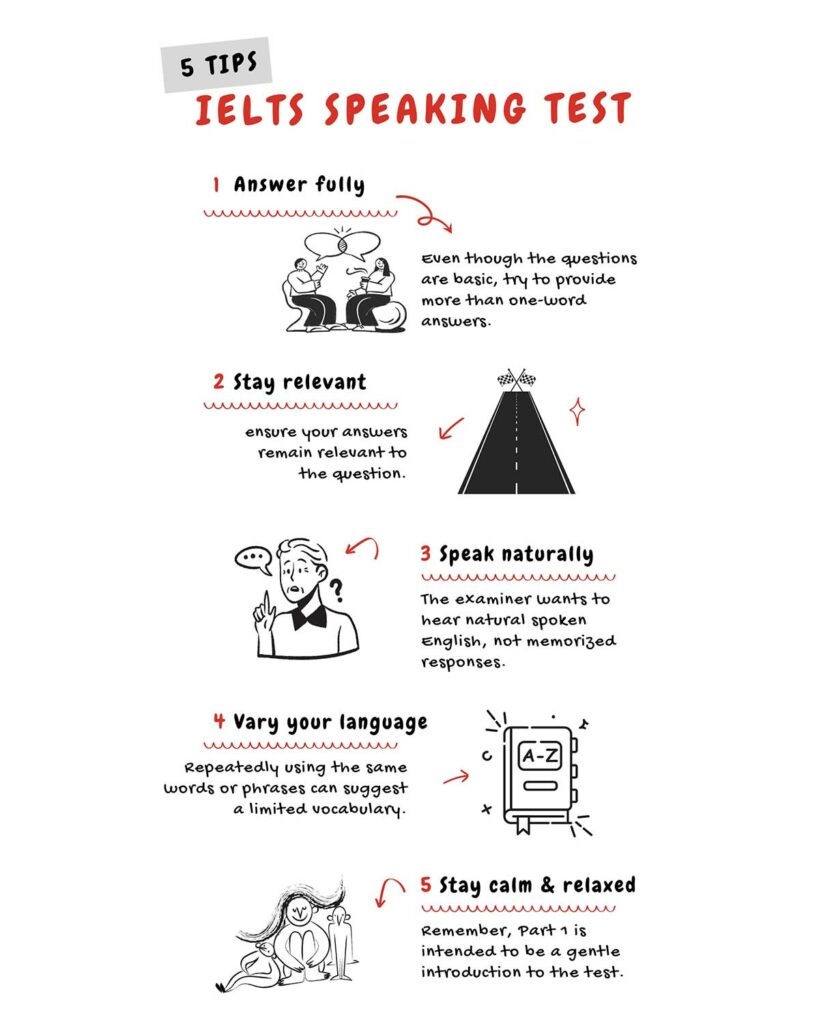
All about IELTS Speaking Part 1 + sample questions and answers
Welcome, learners!
Are you planning to take the IELTS test?
Nervous about the speaking part? Don’t worry, you’re not alone! Many people say that the speaking part is the scariest part for them.
The good news is that you’ve come to the right place!
We’ll help you get prepared to ace your Speaking test and get your dream score!
So, without further ado, let’s get started!

Speaking test overview
The IELTS Speaking section is designed to assess your spoken English skills. The aim is to evaluate your ability to communicate clearly, accurately, and coherently in English in various situations. The test seeks to evaluate your use of English in a spontaneous way, rather than just recalling memorized phrases or answers.
- Duration: The Speaking test lasts 11–14 minutes.
- Format: The test is divided into three parts:
Part 1: Introduction and Interview (4-5 minutes)
The examiner introduces themselves and asks you to introduce yourself.
The examiner will ask you general questions about yourself and familiar topics such as your home, family, studies, work, hobbies, etc.
This part aims to make you feel comfortable and ease you into the test environment.
Part 2: Long Turn (3-4 minutes)
You will receive a task card with a topic and points you should cover in your talk.
You will be given 1 minute to prepare and make notes.
Then, you’ll be asked to speak for 1-2 minutes on the topic.
The examiner might ask one or two questions related to your talk after you finish.
Part 3: Discussion (4-5 minutes)
The examiner will ask questions related to the topic from Part 2, but these questions will be more complex.
This part will involve discussing broader issues and ideas. You might be asked to justify your opinions, discuss related challenges, or speculate about future trends.
Today, we’ll take a closer look at Speaking Part 1. Here’s a more detailed breakdown:
Speaking Part 1
Duration: 4-5 minutes.
Content:
- Introduction
The test begins with the examiner introducing themselves and confirming the identity of the candidate.
The examiner then asks the candidate to introduce themselves.
- General Questions:
The examiner asks the candidate a series of questions on familiar topics. The goal here is to gauge the candidate’s ability to communicate in everyday situations.
Topics commonly addressed include hobbies, work, studies, daily routines, family, and friends. However, the range of topics is not strictly limited to these.
- Scoring
Speaking Part 1, just like Part 2 and Part 3, is scored. However, there isn’t a separate score for each part. Instead, the candidate’s performance across all three parts contributes to a single Speaking band score.
The scoring for the Speaking test is based on four criteria:
Fluency and Coherence: This assesses how well you can express ideas and how well you can speak at length using a range of connectives and cohesive devices.
Lexical Resource: This examines the range and accuracy of your vocabulary. Can you discuss various topics using appropriate vocabulary without many repetitions?
Grammatical Range and Accuracy: This evaluates the range and accurate use of your grammar. How well can you form different types of sentences? Are your sentences mostly error-free?
Pronunciation: This determines how easy it is to understand you. It’s not about having a “perfect” British or American accent but about clear and effective communication.
Each of these criteria is equally weighted, and you’ll get a band score from 1 to 9 for each. The average of these four scores then determines your overall Speaking band score.
While Part 1 may seem more relaxed and straightforward, it’s essential to perform well in this section as it sets the stage for the subsequent parts of the Speaking test. Answering clearly, confidently, and accurately in Part 1 can provide a good foundation for the more complex discussions in Parts 2 and 3.
Sample questions and answers
Question: Can you tell me your full name, please?
Answer: Yes, my name is Sarah Kartika Fahrani.
Question: Where are you from?
Answer: I’m from Bali, Indonesia. It’s an island known for it’s beautiful beaches and amazing culture.
Question: Do you work or study?
Answer: I currently work as a software developer for a tech startup. We focus on creating mobile apps for educational institutions.
Question: What do you like most about your job?
Answer: What I love most about my job is the creative freedom it offers. I get to brainstorm new features, solve challenging problems, and see the direct impact of my work when users interact with our apps.
Question: Do you enjoy reading?
Answer: Absolutely! I’ve always been an avid reader. I particularly enjoy historical fiction because it allows me to learn about different periods in history while getting engrossed in a story.
Question: How do you usually spend your weekends?
Answer: My weekends are a mix of relaxation and activity. I usually start my day with a long run in the park, followed by brunch with friends. In the evenings, I might watch a movie or dive into a good book.
Question: Tell me about your favorite food.
Answer: My favorite food has to be sushi. I love the variety of flavors and textures, from the freshness of the fish to the tangy taste of pickled ginger. Plus, it’s both delicious and healthy!
Question: How often do you use the internet?
Answer: I use the internet daily, both for work and leisure. At work, it’s essential for research and communication. In my free time, I browse social media, read news articles, and watch videos.
Question: How often do you travel?
Answer: Before the pandemic, I used to travel at least once a year, mostly for vacations. I love exploring new cultures, tasting different cuisines, and soaking in the history of new places. It’s always an enriching experience.
Question: Describe your hometown.
Answer: I come from Kyoto in Japan. It’s a mesmerizing blend of old and new. You can find centuries-old temples and shrines right next to modern skyscrapers. The city is especially beautiful during cherry blossom season.
These sample answers demonstrate clarity, a reasonable range of vocabulary, and natural expressions. When practicing, it’s beneficial to answer various questions, extend your responses, and ensure you’re comfortable speaking about everyday topics.
Remember, while these answers serve as examples, it’s essential to provide genuine and personal responses during the test. Practicing with a wide array of questions and focusing on expressing yourself naturally can make a significant difference in your performance.
Tips to ace your IELTS Speaking Part 1
- Answer fully
Even though the questions are basic, try to provide more than one-word answers. For instance, if asked about your favorite food, instead of just naming it, you could explain why you like it and perhaps share a memory associated with it.
You can use the AREA formula to help you with answering questions from part 1.
Question: Do you enjoy outdoor activities?
Answer (A): Yes, I definitely enjoy outdoor activities.
Reason (R): They offer a great way to relax, reconnect with nature, and break the monotony of indoor work.
Example (E): For instance, last month I went hiking with some friends. The experience was refreshing, and the panoramic views at the summit were absolutely breathtaking.
Answer Again (A): So, yes, outdoor activities are something I truly cherish.
- Stay relevant
While you should aim for elaboration, ensure your answers remain relevant to the question. Avoid drifting into unrelated topics. If you stray off-topic, you might not fully address the question, which can result in lost marks. It’s also important to remember that the IELTS Speaking test is time-bound. Going off on a tangent might mean that you won’t have enough time to adequately address subsequent questions, which could affect your overall score.
- Speak naturally
The examiner wants to hear natural spoken English, not memorized responses. Natural speech is not always perfect. There might be occasional pauses, hesitations, or self-corrections. It’s okay to take a moment to gather your thoughts before responding.
If a candidate delivers an answer that sounds rehearsed or as if it has been memorized verbatim, it can come across as unnatural. The flow, intonation, and even word choice can give away memorized content.
- Vary your language
Repeatedly using the same words or phrases can suggest a limited vocabulary. By varying your language, you can demonstrate a broader range of vocabulary, which is especially important in IELTS test. However, again, keep it natural.
- Stay calm and relaxed
Remember, Part 1 is intended to be a gentle introduction to the test. The questions are about you and your life, so you are already an expert on the answers!
Summary
Preparing for Part 1 is generally about getting comfortable speaking about everyday topics in English. It can be helpful to practice speaking about your daily routine, hobbies, likes, and dislikes with a friend or teacher, or even recording yourself to play back and evaluate.
At IELC, we teach English the right way
Our goal is to get you speaking in English with fluency and confidence as fast as possible. We want to give you the skills you need to fulfil your potential!
Our experienced teachers will guide you along every step of the learning process to ensure that you are not wasting your time, money, and energy on useless language exercises & wrong methods.
Our courses
With our modern campus and technology, we are equipped to provide the best possible courses for children, teens, and adults, including:
Online and on campus IELTS courses
Online and on campus TOEFL PBT courses
Online and on campus TOEFL iBT courses
We offer our classes in group classes or private classes.
No matter what your goals are, our team will help you achieve these goals by providing you with Indonesia’s best English courses!
Talk to our team today to get your FREE consultation and take your first step towards success.
Sincerely,

IELC Academic Director
